- Home
- Stephen R. Donaldson
White Gold Wielder Page 6
White Gold Wielder Read online
Page 6
It’s not that cold, he told himself. It’s just wind. But still the chill cut at him. No matter how he hugged the robe about him, the wind found its way to his skin.
Instinctively he went to the galley, looking for warmth and Linden.
He found her there, seated at one wall near the cheery bustle of the dromond’s two cooks, a husband and wife aptly named Seasauce and Hearthcoal. They had spent so much of their lives working over the great stoves that their faces had become perpetually ruddy. They looked like images of each other as they blustered about their tasks, moving with a disingenuous air of confusion which concealed the ease of their teamwork. When they went out on deck, heat overflowed from them; and in their constricted demesne they radiated like ovens. Yet Covenant’s chill persisted.
Linden was awake, but still glazed with sleep. She had paid only a part of the debt of her weariness. Though she acknowledged Covenant, behind her eyes everything was masked in somnolence. He thought at once that he should not bother her with questions until she had rested more. But he was too cold for good intentions.
Hunkering down beside her, he asked, “What do you think of this wind?”
She yawned. “I think,” she said distantly, “that Foul’s in a hurry to get us back.
However, after another day’s rest, Linden was able to look at the weather more percipiently. By then, Covenant had worn himself petulant with aimless anxiety. He felt repeatedly that he had lost the center of his life, that he could no longer hold himself from flying outward in all directions when the vertigo of his fear arose. Nothing had happened to suggest that the dromond was in danger: yet his inchoate conviction of peril remained. Snappishly he asked Linden his question a second time.
But long sleep had brought her back to herself, and the gaze she turned toward him was capable of knowledge. She seemed to see without effort that his irritation was not directed at her. She placed a brief touch on his forearm like a promise that she would not forsake him. Then she went out to look at the wind.
After a moment’s assessment, she declared that this blow was not unnatural or ill, not something which the Despiser had whipped up for his own ends. Instead it was a reaction to the fundamental convulsion which had pulled down the Isle of the One Tree. By that violence, the balances of the weather had been disturbed, outraged.
It was conceivable that Lord Foul had known this would happen. But she felt no evidence of his influence on the wind.
When Covenant relayed her verdict to Honninscrave, the Master shrugged, his thoughts hidden behind the buttress of his brows. “No matter,” he muttered as if he were not listening to himself. “Should it worsen, Starfare’s Gem must run before it. Part-masted as we are, I will not hazard resistance to the wind’s path. There is no need. At present, we are borne but a scant span from our true way.”
That should have satisfied Covenant His experience of the sea was trivial compared to Honninscrave’s. Yet the alarm in his guts refused to be eased. Like Galewrath, the Master conveyed an impression of concealed worry.
During the next two days, the wind became more serious.
Blowing with incessant vehemence a few points west of north, it cut into the sea like the share of a plow, whined across the decks of the dromond like the ache of its own chill. In spite of its speed, Starfare’s Gem no longer appeared to be moving swiftly: the wind bore the water itself northward, and what little bowwave the prow raised was torn away at once. Clouds hugged the world from horizon to horizon. The sails looked gray and brittle as they heaved the heavy stone along.
And that night the cold began in earnest
When Covenant scrambled shivering out of his hammock the next morning, he found a scum of ice in the washbasin which Cail had set out for him. Faint patches of frost licked the moire-granite as if they had soaked in through the walls. Passing Vain on his way to the warmth of the galley, he saw that the Demondim-spawn’s black form was mottled with rime like leprosy.
Yet the Giants were busy about their tasks as always. Impervious to fire if not to pain, they were also proof against cold. Most of them labored in the rigging, fighting the frozen stiffness of the lines. For a moment while his eyes teared, Covenant saw them imprecisely and thought they were furling the sails. But then he saw clouds blowing off the canvas like steam, and he realized that the Giants were beating the sails to prevent the frost on them from building into ice. Ice might have torn the canvas from the spars, crippling Starfare’s Gem when the dromond’s life depended upon its headway.
His breathing crusted in his beard as he let the wind thrust him forward. Without Cail’s help, he would have been unable to wrestle open the galley door. Slivers of ice sprang from the cracks and vanished inward as the Haruchai broke the seal caused by the moisture of cooking. Riding a gust that swirled stiffly through the galley, Covenant jumped the storm-sill and nearly staggered at the concussion as the door slammed behind him.
“Stone and Sea!” Hearthcoal barked in red-faced and harmless ire. “Are you fools, that you enter aft rather than forward in this gale?” With a dripping ladle, she gestured fiercely at the other seadoor. Behind her, Seasauce clanged shut his stove’s firebox indignantly. But a moment later, all vexation forgotten, he handed Covenant a steaming flagon of diluted diamondraught, and Hearthcoal scooped out a bowl of broth for him from the immense stone pot she tended. Awkward with self-consciousness, he sat down beside Linden against one wall out of the way of the cooks and tried to draw some warmth back into his bones.
In the days that followed, he spent most of his time there, sharing with her the bearable clangor and heat of the galley. In spite of his numbness, the cold was too fierce for him; and for her it was worse because her senses were so vulnerable to it. He made one more attempt to sleep in his cabin; but after that he accepted a pallet like hers in the galley. The wind mounted incrementally every day, and with it the air grew steadily more frigid. Starfare’s Gem was being hurled like a jerrid toward the ice-gnawed heart of the north. When Giants entered the galley seeking food or warmth, their clothing was stiff with gray rime which left puddles of slush on the floor as it melted. Ice clogged their beards and hair, and their eyes were haggard. Covenant made occasional forays out on deck to observe the state of the ship; but what he saw—the thick, dire sea, the lowering wrack, the frozen knurs of spume which were allowed to chew at the railings because the crew was too hard-pressed to clear them away—always drove him back to the galley with a gelid knot in his chest.
Once he went far enough forward to look at Findail. When he returned, his lips were raw with cold and curses. “That bastard doesn’t even feel it,” he muttered to no one in particular, although Pitchwife was there with Linden, Mistweave, the two cooks, and a few other Giants. “It goes right through him.” He could not explain his indignation. It simply seemed unjust that the Appointed should be untouched by the plight of the dromond.
But Linden was not looking at him: her attention was fixed on Pitchwife as if she wanted to ask him something important. At first, however, she had no opportunity to interpose her question. Pitchwife was teasing Hearthcoal and Seasauce like a merry child and laughing at the concealed humor of their rebuffs. He had a Giant’s tall spirit in his bent frame, and more than a Giant’s capacity for mirth. His japing dissipated some of Covenant’s acid mood.
At last Pitchwife wrung an involuntary laugh from the cooks; and with that he subsided near Covenant and Linden, the heat of the stoves gleaming on his forehead. Covenant was conscious of Linden’s tautness as she mustered her inquiry. “Pitchwife, what’re we getting into?”
The Giant looked at her with an air of surprise which might have been feigned.
“Nobody wants to talk about it,” she pursued. “I’ve asked Galewrath and Sevinhand, but all they say is that Starfare’s Gem can go on like this indefinitely. Even Mistweave thinks he can serve me by keeping his mouth shut.” Mistweave peered studiously at the ceiling, pretending he did not hear what was said. “So I’m asking you. You’ve never
held anything back from me.” Her voice conveyed a complex vibration of strain. “What’re we getting into?”
Outside the galley, the wind made a peculiar keening sound as it swept through the anchorholes. Frost snapped in the cracks of the doors. Pitchwife did not want to meet her gaze; but she held him. By degrees, his good cheer sloughed away; and the contrast made him appear older, eroded by an unuttered fear. For no clear reason, Covenant was reminded of a story Linden had told him in the days before the quest had reached Elemesnedene—the story of the role Pitchwife had played in the death of the First’s father. He looked now like a man who had too many memories.
“Ah, Chosen,” he sighed, “it is my apprehension that we have been snared by the Dolewind which leads to the Soulbiter.”
The Soulbiter.
Pitchwife called it an imprecise sea, not only because every ship that found it did so in a different part of the world, but also because every ship that won free of it again told a different tale. Some vessels met gales and reefs in the south; others, stifling calms in the east; still others, rank and impenetrable beds of sargasso in the west. In spite of this, however, the Soulbiter was known for what it was; for no craft or crew ever came back from it unscathed. And each of those ships had been driven there by a Dolewind that blew too long without let or variation.
Linden argued for a while, vexed by the conflicting vagueness and certainty of Pitchwife’s explanations. But Covenant paid no heed to either of them. He had a name now for his chill anxiety, and the knowledge gave him a queer comfort. The Soulbiter. It was not Lord Foul’s doing. Neither could it be avoided. And the outcome of that sea might make all other fears unnecessary. Very well. The galley was too warm; but outside cried and groaned a cold which only Giants could endure for any length of time. Eventually even the din of the cooks became soothing to him, and he passed out of trepidation into a kind of waking somnolence—a stupefied inner silence like an echo of the emptiness which the Elohim had imposed upon him in Elemesnedene.
That silence comprised the only safety he had known in this world. It was a leper’s answer to despair, a state of detachment and passivity made complete by the deadness of every nerve which should have conveyed import. The Elohim had not invented it: they had simply incarnated in him the special nature of his doom. To feel nothing and die.
Linden had once redeemed him from that fate. But now he was beaten. He made decisions, not because he believed in them, but because they were expected of him. He did not have the heart to face the Soulbiter.
In the days that followed, he went through the ordinary motions of being alive. He drank enough diamondraught to account for his mute distance to the people who watched him. He slept in the galley, took brief walks, acknowledged greetings and conversations like a living man. But inwardly he was becoming untouchable. After years of discipline and defiance, of stubborn argument against the seduction of his illness, he gave the effort up.
And still Starfare’s Gem plowed a straight furrow across the gray and gravid sea while the wind blew arctic outrage. Except for a few worn paths here and there, the decks were now clenched with ice, overgrown like an old ruin. Its sheer weight was enough to make the Giants nervous; but they could not spare time or strength to clear the crust away. There was too much water in the wind: the blow sheared too much spray off the battered waves. And that damp collected in the sails faster than it could be beaten clear. At intervals, one stretch of canvas or another became too heavy to hold. The wind rent it out of its shrouds. A hail of ice-slivers swept the decks; tattered scraps of sail were left flapping like broken hands from the spars. Then the Giants were forced to clew new canvas up the yards. Bereft of its midmast, the granite dromond needed all its sails or none.
Day after day, the shrill whine of the rigging and the groans of the stone became louder, more distressed. The sea looked like fluid ice, and Starfare’s Gem was dragged forward against ever-increasing resistance. Yet the Giantship was stubborn. Its masts flexed and shivered, but did not shatter. Grinding its teeth against the gale, Starfare’s Gem endured.
When the change came, it took everyone by surprise. Rest had restored the combative smolder to Linden’s eyes, and she had been fretting for days against the maddening pressure of the blast and the constriction of the galley; but even she did not see what was coming. And the Giants had no warning at all.
At one moment, Starfare’s Gem was riding the howl of the wind through the embittered heart of a cloud-dark night. At the next, the dromond pitched forward like a destrier with locked forelegs; and the gale was gone. The suddenness of the silence staggered the vessel like a detonation. There was no sound except the faint clink and crash of ice falling from the slack sails. Linden jerked her percipience from side to side, probing the ship. In astonishment, she muttered, “We’ve stopped. Just like that.”
For an instant, no one moved. Then Mistweave strode to the forward door, kicked it out of its frost. Cold as pure as absolute winter came flowing inward; but it had no wind behind it. The air across the Giantship was still.
Shouts sprang along the decks. In spite of his inward silence, Covenant followed Mistweave and Linden out into the night.
The clouds were gone: the dark was as clear and sharp as a knife-edge. Spots of light marked out the Giantship as the crew lit more lanterns. Near the eastern horizon stood the moon, yellow and doleful. It was nearly full, but appeared to shed no illumination, cast no reflection onto the black and secret face of the water. The stars littered the sky in every direction, all their portents lost. Linden muttered to herself, “What in hell—?” But she seemed unable to complete the question.
Honninscrave and Pitchwife approached from opposite ends of the ship. When the First joined them, Pitchwife said with unconvincing nonchalance, “It appears that we are here.”
Covenant felt too numb to be cold. But Linden was shivering violently beside him. In a bitten voice, she asked, “What do we do now?”
“Do?” replied Honninscrave distantly. His visage was benighted, devoid of content. “This is the Soulbiter. We must await its will.” Plumes of steam came from his mouth as if his spirit escaped him at every word.
Its will, Covenant thought dumbly. My will. Foul’s will. Nothing made any difference. Silence was safety. If he could not have hope, he would accept numbness. Returning to the galley, he curled up on his pallet and fell immediately asleep.
But the next morning he was awakened by the cold and the quiet. The stoves put out no heat. Except for Cail, the galley was deserted. Abandoned. Starfare’s Gem lay as still as if he and the Haruchai were the only people left aboard.
A pang went through him, threatening his defenses. Stiff with sleep and chill, he fumbled erect. “Where—?” he asked weakly. “Where did they go?”
Cail’s reply was flat and pitiless. “They have gone to behold the Soulbiter.”
Covenant winced. He did not want to leave the confines of the galley. He feared the return of sensation and pain and responsibility. But Cail’s expressionless stare was insistent. Cail was one of the Haruchai, kindred to Brinn and Bannor. His comrades Ceer and Hergrom had given their lives. He had the right to make demands. And his gaze was as plain as words:
It is enough. Now you must resume yourself.
Covenant did not want to go. But he adjusted his rumpled attire, made an effort to secure the silence closely about him. When Cail opened the door for him, he took a step over the storm-sill and walked blinking into the bright, frigid morning.
After so many days hidden behind the glower of the clouds, the sun alone would have been enough to blind him. But it was not alone. White cold glared around the ship. Light sprang at him from all sides; dazzles as piercing as spears volleyed about his head. His tears froze on his cheeks. When he raised his hands to rub the beads away, small patches of skin were torn from his face.
But slowly his sight cleared. He saw Giants lining the rails, their backs to him. Everyone on board stood at the forward railings somewhere, facing
outward.
They were still, as quiet as the sea and the sails hanging empty in their gear. But no hush could silence their expectant suspense. They were watching the Soulbiter. Waiting for it.
Then he recovered enough vision to discern the source of all the dazzling.
Motionless in the water, Starfare’s Gem lay surrounded by a flotilla of icebergs.
Hundreds of them in every size and configuration. Some were mere small humps on the flat sea. Others raised jagged crests to the level of the dromond’s spars. And they were all formed of the same impeccable ice: ice as translucent and complete as glass, as bard-faced as diamonds; ice on which the morning broke, shattering light in all directions.
They were moving. Singly or in squadrons, they bore slowly down on the ship as they floated southward. A few came so close that a Giant could have reached them in one leap. Yet none of them struck the dromond.
Along the deep the flotilla drifted with a wondrous majesty, as bewitching as the cold. Most of the Giants stood as if they had been carved from a muddier ice. They scarcely breathed while their hands froze to the rails and the gleaming burned into their eyes. Covenant joined Linden near the First, Pitchwife, and Mistweave. Behind the raw red of cold in her face lay a blue pallor as if her blood had become as milky as frost; but she had stopped shivering, paid no heed to the drops of ice which formed on her parted lips. Pitchwife’s constant murmur did not interrupt the trance. Like everyone else, he watched the ice pass stately by as if he were waiting for someone to speak. As if the sun-sharp wonder of this passage were merely a prelude.
Covenant found that he, too, could not look away. Commanded by so much eye-piercing glister and beauty, he braced his hands on one of the crossbeams of the railing and at once lost the power of movement. He was calm now, prepared to wait forever if necessary to hear what the cold was going to utter.

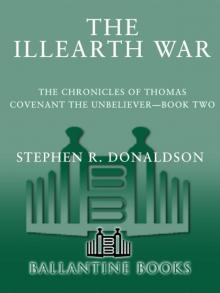 The Illearth War
The Illearth War Last Chronicles of Thomas Covenant 02 - Fatal Revenant
Last Chronicles of Thomas Covenant 02 - Fatal Revenant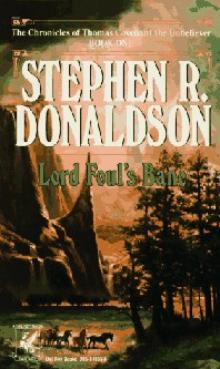 Lord Foul's Bane
Lord Foul's Bane The Gap Into Ruin: This Day All Gods Die
The Gap Into Ruin: This Day All Gods Die White Gold Wielder
White Gold Wielder Fatal Revenant
Fatal Revenant The Mirror of Her Dreams
The Mirror of Her Dreams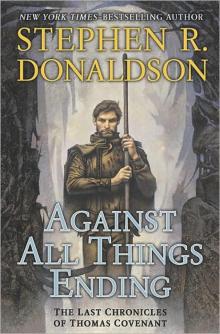 Against All Things Ending
Against All Things Ending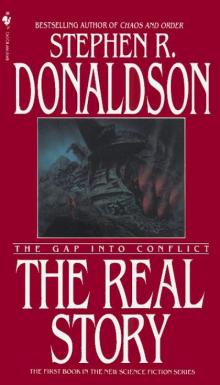 The Real Story: The Gap Into Conflict
The Real Story: The Gap Into Conflict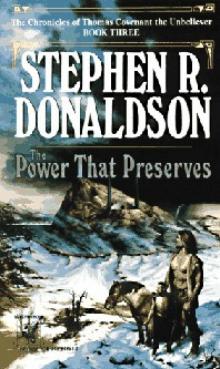 The Power That Preserves
The Power That Preserves Seventh Decimate
Seventh Decimate The Gap Into Power: A Dark and Hungry God Arises
The Gap Into Power: A Dark and Hungry God Arises A Man Rides Through
A Man Rides Through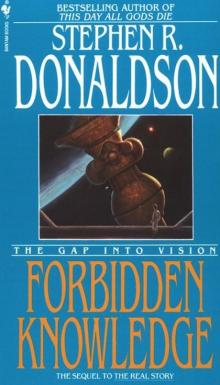 The Gap Into Vision: Forbidden Knowledge
The Gap Into Vision: Forbidden Knowledge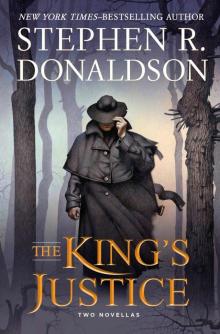 The King's Justice: Two Novellas
The King's Justice: Two Novellas The Wounded Land
The Wounded Land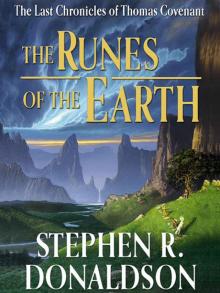 The Runes of the Earth
The Runes of the Earth Mordant's Need
Mordant's Need The One Tree
The One Tree Gilden-Fire
Gilden-Fire Reave the Just and Other Tales
Reave the Just and Other Tales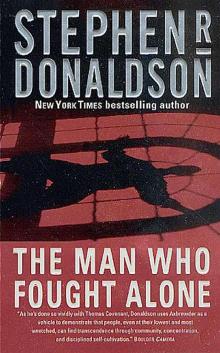 The Man Who Fought Alone
The Man Who Fought Alone The Last Dark
The Last Dark The Man Who Tried to Get Away
The Man Who Tried to Get Away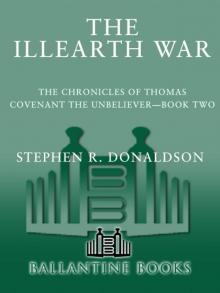 Thomas Covenant 02: The Illearth War
Thomas Covenant 02: The Illearth War A Dark and Hungry God Arises
A Dark and Hungry God Arises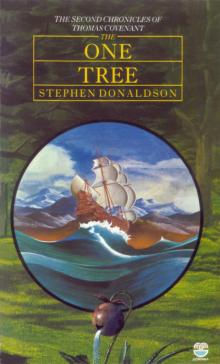 The One Tree t2cotc-2
The One Tree t2cotc-2 Lord Foul's Bane cotc-1
Lord Foul's Bane cotc-1 The Illearth War t1cotc-2
The Illearth War t1cotc-2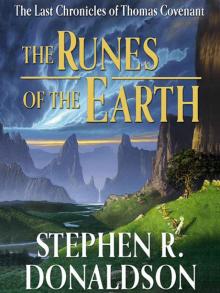 The Runes of the Earth: The Last Chronicles of Thomas Covenant - Book One
The Runes of the Earth: The Last Chronicles of Thomas Covenant - Book One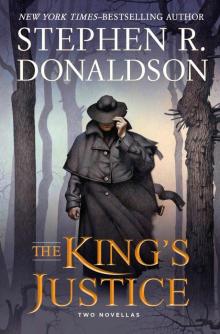 The King's Justice
The King's Justice White Gold Wielder t2cotc-3
White Gold Wielder t2cotc-3 The Power That Preserves t1cotc-3
The Power That Preserves t1cotc-3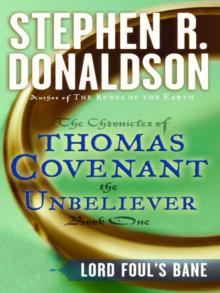 Thomas Covenant 01: Lord Foul's Bane
Thomas Covenant 01: Lord Foul's Bane Chaos and Order: The Gap Into Madness
Chaos and Order: The Gap Into Madness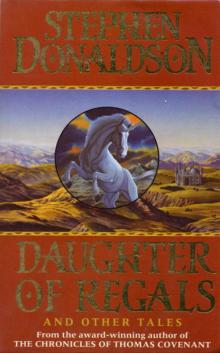 Daughter of Regals
Daughter of Regals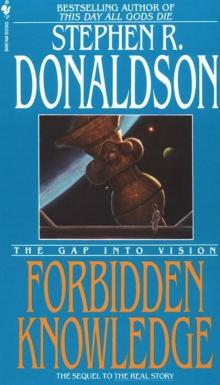 Forbidden Knowledge: The Gap Into Vision
Forbidden Knowledge: The Gap Into Vision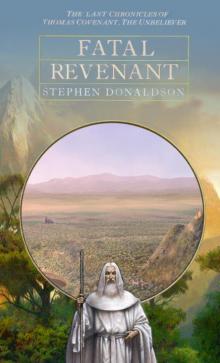 Fatal Revenant t3cotc-2
Fatal Revenant t3cotc-2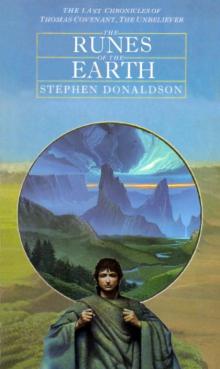 The Runes of the Earth t3cotc-1
The Runes of the Earth t3cotc-1 Thomas Covenant 03: Power That Preserves
Thomas Covenant 03: Power That Preserves This Day all Gods Die: The Gap into Ruin
This Day all Gods Die: The Gap into Ruin The Wounded Land t2cotc-1
The Wounded Land t2cotc-1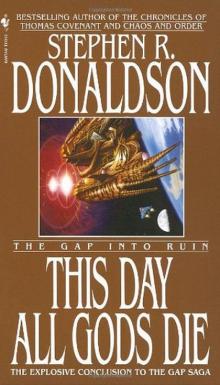 This Day All Gods Die
This Day All Gods Die One Tree
One Tree